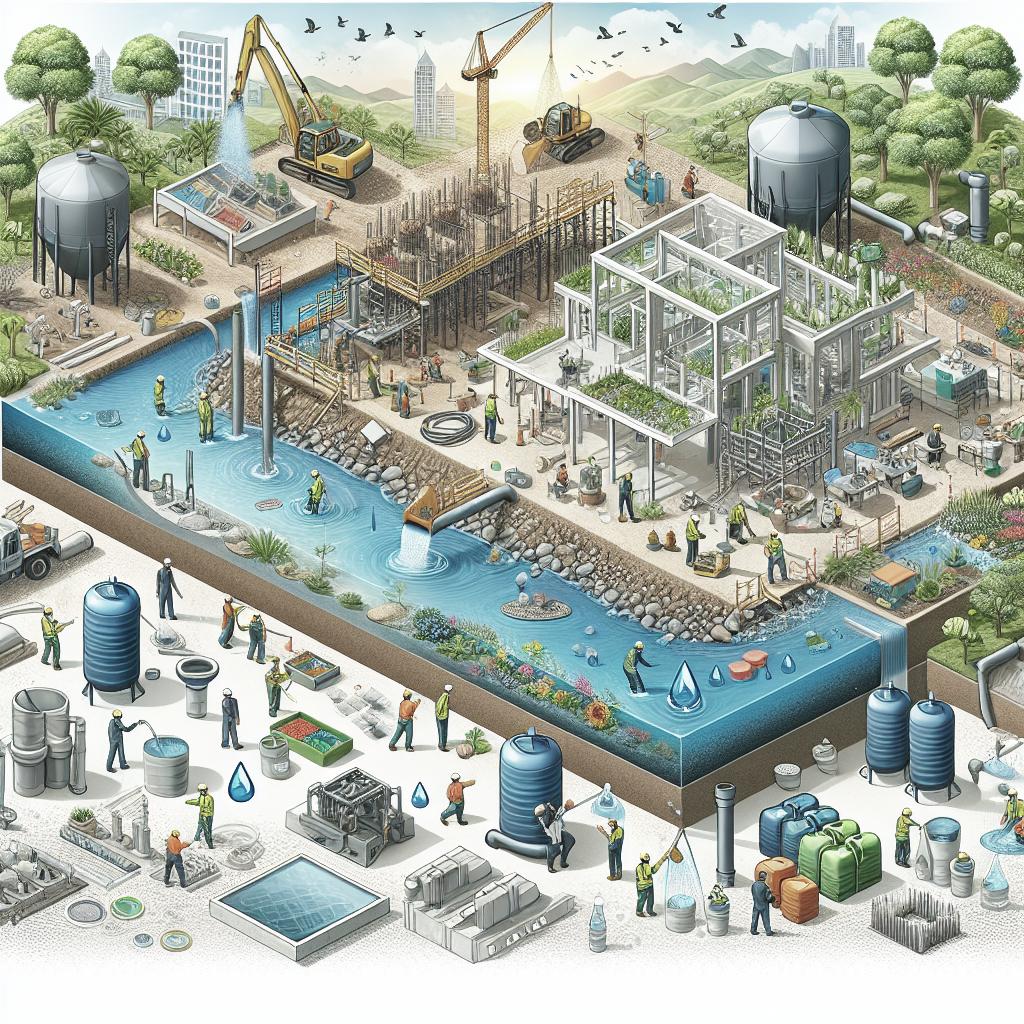“`html
How to Manage Water Resources During Construction
Managing water resources efficiently and sustainably is crucial in the construction industry. This blog post explores sustainable solutions and technologies that can be adopted to minimize water wastage and pollution on construction sites. We’ll discuss best management practices (BMPs), the implementation of cutting-edge water management technologies, the importance of educating and training personnel, and the significance of ongoing monitoring and reporting. By adopting these strategies, the construction industry can achieve significant environmental benefits while ensuring compliance with regulations.
Sustainable Solutions for Water Management in Construction Sites
Sustainable water management in construction starts with the recognition of the environmental impacts of construction activities. Construction sites can introduce contaminants into the water supply and contribute to the depletion of local resources. By adopting sustainable solutions, companies not only comply with environmental regulations but also contribute to the overall health of the ecosystem.
An integrated approach combining policy, technology, and education is essential for effective water resource management. This requires a commitment to innovation and a willingness to incorporate sustainable practices across all stages of the construction process. By prioritizing water conservation and pollution prevention, the industry can move towards a more sustainable model.
Implementing Best Management Practices (BMPs):
Best Management Practices (BMPs) are a set of guidelines or control measures tailored to minimize the environmental impacts associated with construction activities. BMPs are designed to manage stormwater, reduce soil erosion, and prevent sedimentation of nearby water bodies. Implementing BMPs is essential for maintaining ecological balance and ensuring water used on-site is clean and well-managed.
The effectiveness of BMPs relies on thorough planning and site-specific assessments. They should be adjusted based on the size of the site, local climate conditions, and potential environmental impacts. The goal is to not only manage water resources responsibly but also to enhance the overall sustainability of construction projects.
Some Common BMPs Include:
Common BMPs involve a range of structural and non-structural measures. Structural BMPs include sediment basins, silt fences, and vegetation planting to control erosion. Non-structural BMPs might include scheduling during dry months, proper materials storage and handling, and regular site inspections.
These practices are selected based on project-specific goals and environmental conditions. By integrating these BMPs into the construction process, companies can significantly reduce their ecological footprint. Importantly, BMPs must be continually revised and updated to incorporate new research findings and technologies.
Utilizing Sustainable Water Management Technologies:
Sustainable water management technologies have advanced significantly, providing new options for conservation and efficiency. Technologies such as rainwater harvesting systems, water recycling processes, and smart irrigation systems are becoming more accessible to the construction industry.
The incorporation of these technologies varies depending on the project’s scale and requirements. For instance, rainwater harvesting can be effective on sites with a high dependency on water for dust suppression. Water recycling systems, on the other hand, can be employed to treat and reuse water for non-potable purposes, enhancing overall efficiency.
Educating and Training Personnel:
Education and training are crucial for sustainable water management on construction sites. Personnel who are knowledgeable about environmental issues related to water management can make informed decisions that benefit both the project and the ecosystem.
Training programs should focus on creating a culture of sustainability within the workforce. By raising awareness and providing the necessary skills, construction companies can ensure that their teams are equipped to implement BMPs and utilize sustainable technologies effectively.
Training Programs Can Cover Topics Such As:
Training can include a wide range of topics such as understanding local water conservation regulations, the functioning and benefits of BMPs, and the adoption of new water-saving technologies. Additionally, programs should emphasize the importance of regular site inspection and monitoring to assess the effectiveness of implemented strategies.
Workshops and hands-on training sessions can also be used to enhance learning and ensure active participation. These programs should be regularly updated to reflect new developments in water conservation technologies and practices.
Monitoring and Reporting:
Ongoing monitoring and reporting are critical components of effective water management during construction. Consistent tracking of water usage, runoff, and potential pollutant levels on-site enables quick identification of issues before they escalate into larger environmental problems.
Reporting provides a tangible record of efforts made towards sustainable water management and helps improve transparency with regulators and stakeholders. By utilizing real-time data collection and analysis, construction managers can better understand the impacts of their projects and make data-driven decisions for continuous improvement.
Future Prospects:
Looking into the future, the expansion of sustainable water management practices in construction represents a significant opportunity to mitigate the environmental impacts of construction activities. As technologies advance and regulations evolve, construction firms need to remain agile and committed to integrating innovative water management solutions into their projects.
Commitment to education, continual adoption of best practices, and investment in new technologies will ensure that the construction industry can not only meet today’s environmental challenges but also contribute to a sustainable future. By fostering a culture that values sustainable water resource management, construction companies will be better positioned to thrive in a more environmentally-conscious market.
| Key Area | Details |
|---|---|
| Sustainable Solutions | Integrating policy, technology, and education to manage water resources sustainably on construction sites. |
| Best Management Practices (BMPs) | Guidelines such as erosion control through sediment basins and silt fences to minimize environmental impacts. |
| Technological Advancements | Utilization of rainwater harvesting, recycling systems, and smart irrigation for water conservation. |
| Personnel Training | Educating team members on BMPs, regulatory compliance, and new technologies to foster sustainable practices. |
| Monitoring and Reporting | Ensures ongoing assessment and transparent reporting of water management efforts on-site. |
“`
